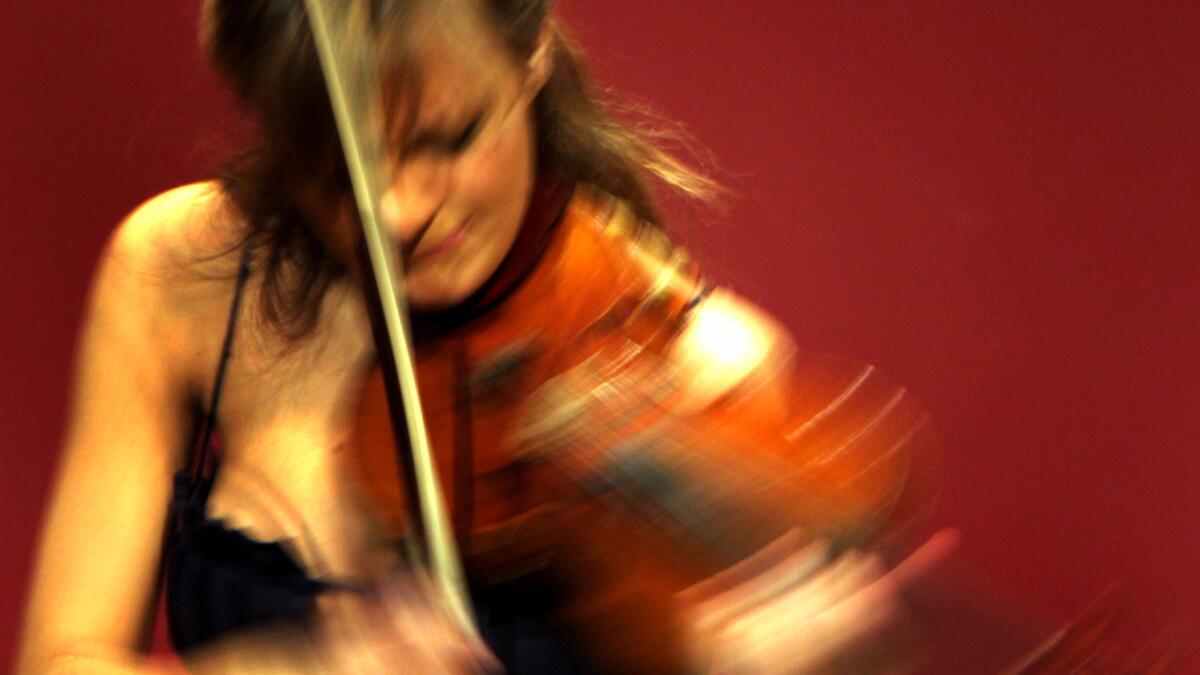The Budapest Festival Orchestra takes over the Bowl

- Share via
The Budapest Festival Orchestra, which began a three-concert stint Tuesday at the Hollywood Bowl, filling in for the touring Los Angeles Philharmonic, has had a regular place on the international best orchestra lists pretty much since Ivan Fischer helped found it in 1983. Still heading the orchestra, the Hungarian conductor, himself, has steadily grown over those 36 years, into one of the world’s most respected.
Together, maestro and his hand-picked musicians from Budapest’s best and brightest and least complacent, take everything they do with utmost seriousness, and their Bowl debut was no exception. Beethoven’s “Egmont” Overture was searing. Brahms’ First Symphony was majestic. Bruch’s syrupy Violin Concerto No. 1 was treated with rare nobility by the orchestra and its refined soloist, Nicola Benedetti. Depth was the order of an admirable evening of music making, in which everything was of the highest order.
But let’s peer around the corner, what came before and after the program, where the situation gets more interesting and less explicable. Our national anthem, a Bowl tradition for orchestral concerts, was played with gracious fervor and some curious added brass business that sounded like a celebratory flourish from Tchaikovsky’s “1812” Overture. But there was no Hungarian anthem to follow.
Then there was the encore. Fischer addressed the audience, reminding us that what the world needs is for everyone to sing. Parents should sing to their children, and children should sing in choruses. To set an endearing example, he then had the players put down their instruments, stand and sing, leading them in an a cappella folk song by Dvorák, a wonderful encore unlike any an orchestra has done before.
Fischer has always meant for his BFO and its members to stand for something. They are meant to be complete musicians. The orchestra gives inventive concerts. It takes political positions, Fischer being an outspoken opponent of Hungary’s authoritarian Fidesz ruling party, its anti-immigration policies and restrictions on the press. For a recent program titled “Dancing in the Square,” Fischer invited a mix of Roma and non-Roma children to dance to Beethoven’s Seventh Symphony at an outdoor concert in front of Budapest’s basilica.
At last summer’s Proms in London, Fischer included a program of Hungarian folk music, and in New York in April, he introduced a performance of Bartok’s opera, “Bluebeard’s Castle,” with the composer’s folk-song arrangements. Fischer has composed an opera, “The Red Heifer,” that specifically addresses institutionalized Hungarian anti-Semitism. He also regularly tours with the orchestra performing his own highly acclaimed semi-staged productions of Mozart operas. His Mahler, Bartók and Dvorák recordings with the orchestra are among the best.
But little of this is represented in the three Bowl programs, which tellingly don’t include a note of Hungarian music -- Haydn’s 88th Symphony, Thursday, was written for the Hungarian court orchestra of Esterháza but that doesn’t really count – and couldn’t be more conventional, full of music we hear here all the time. The big work Thursday will be Dvorák’s “New World” Symphony. Next week, it’s Mozart’s “Jupiter” Symphony and his Requiem.
There was surely, though, a political statement at the beginning of Tuesday program. Beethoven’s overture to Goethe’s “Egmont” compellingly condenses the drama of overthrowing totalitarian rule. Any performance that doesn’t make that apparent is irresponsible. The Budapesters were gripping from the first chords on, as though this were personal. It is a physical orchestra, and the intensity in the dug-in string playing seemed to represent the essence of repression. The forceful wind players seen on the Bowl’s video screens offered powerful theater all by themselves. The brass rang the call for freedom in way to fill the streets with triumph.
The Brahms symphony was less exciting. Missing was the playfulness that helps enliven the central movements. There was no lack of granitic intensity in the outer movements. Details were lovingly if soberly revealed, Brahms placed high on a pedestal.
That might have been more effective had Bruch not been placed on this same pedestal. His chestnut concerto needs no advocates. Even a sourpuss like Heifetz let his hair down madly dashing through the finale like a child’s first moments at Disneyland. Benedetti brought a surfeit of beauty and elegance to Bruch, but there was no hint of the kind of swinging Wynton Marsalis has lately brought out in her. It’s hard to argue with great playing, and the Budapest band -- even accompanying Bruch -- remained at its best. But just think what they and Benedetti might have brought to Bartók.
More to Read
The biggest entertainment stories
Get our big stories about Hollywood, film, television, music, arts, culture and more right in your inbox as soon as they publish.
You may occasionally receive promotional content from the Los Angeles Times.











